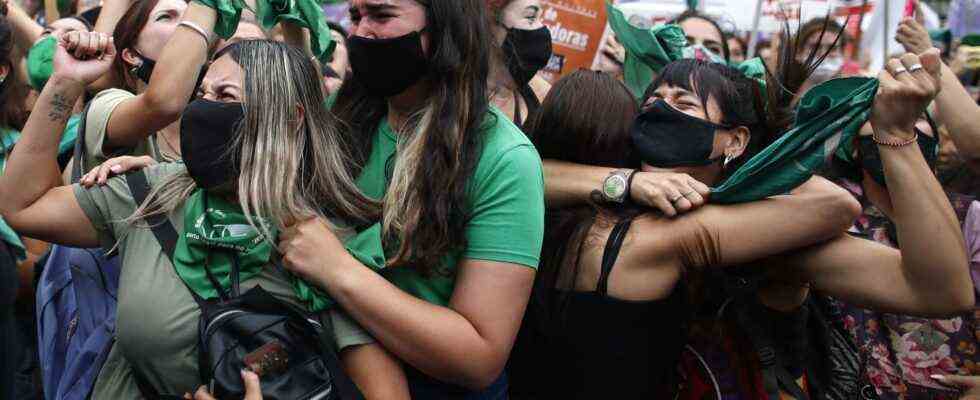Status: 12/30/2021 6:45 a.m.
In Argentina women are fighting to implement a historic law: abortions have been legal for a year. But there is resistance in conservative areas.
Alicia Zubira and Eliana Neme bend over a booklet full of phone numbers. Who do you have to call, where do you have to ask about everything? Zubiria and Neme accompany women who want to have an abortion with medication. They are part of the “socorristas en red” network in the northern Argentine province of Tucuman. Even before legalization, they campaigned for women who wanted an abortion. Now they are protected by the law that is now one year old.
Until then, abortions were only allowed in a few exceptional cases in Argentina, for example after rape. But some women could not have afforded another child, says Zubira, others had failed contraception, others were raped by their partner and the police did not believe them.
The cheering was all the greater when, at dawn on December 30, 2020, the Argentine Senate voted for the legalization of abortions up to the 14th week of pregnancy: a breakthrough for the women’s movement after 30 years of struggle against conservative and Catholic morals.
Without their massive pressure, the law would not have existed, says sociologist Verónica Gago. The green kerchief with which women had demonstrated against the old abortion law became the symbol of a new feminist movement across Latin America.
A difficult environment
And today, a year after the reform? To meet Zubiria and Neme, you have to drive to Amaicha del Valle: three hours from the provincial capital, in the mountains, where giant cacti line the streets. It’s an idyllic place. But for women who want to end their pregnancy, the barren, strictly Catholic mountain region remains a difficult environment to this day.
“If you can’t safely end an unwanted pregnancy here, it can mean death,” says Neme. Some women used to resort to life-threatening practices in order to terminate the pregnancy. Many died from it. That motivated her to help.
Before the reform, Argentina had an estimated 500,000 clandestine abortions annually. A year later, the country took stock: 32,758 abortions had occurred in the public health system between the beginning of the year and the end of November. There are also around 46,300 abortions with the drug misoprostol. Comparative figures are still missing, because much of what is now coming into focus was previously in the dark. The responsible minister, Elisabeth Gómez Alcorta, is satisfied: “We can say that no woman in Argentina has to die of a secret abortion any more.”
They see their fight for a modern abortion law as far from over: Alicia Zubira and Eliana Neme
Image: ARD Studio South America
The resistance remains
But Zubiria and Neme have remained a point of contact even after the legalization of abortion because they listen and do not judge anyone who seeks their help. In the public health system in Tucuman, however, abortion has often remained a taboo.
Gynecologist Gisela Reynaga works in one of the four maternity clinics in the provincial capital. Before the pandemic, she would often demonstrate against abortion with a giant paper mache fetus. Out of 30 doctors in their hospital, 27 would refuse abortions for reasons of conscience. The law enables this way out. “This number alone shows,” says Reynaga, “that a majority in the region does not agree with it.” In some provinces, the struggle for legalization has turned into the struggle for implementation of the law.
A reform with charisma
The effect of the law extends far beyond Argentina. “It is a signal for the continent,” says sociologist Gago, “because Argentina is the first large country in Latin America with a progressive abortion law.”
Indeed, Argentina created a dynamic: in Mexico, the Supreme Court ruled that an absolute ban on abortion was unconstitutional. In Chile, a bill on the impunity of abortions recently failed. Like Brazil and Peru, the country still only allows abortions in a few exceptions. They are generally forbidden in El Salvador and Nicaragua – they are also made there secretly, often at risk of death.
The fear is gone
In Tucuman, in northern Argentina, the opponents of abortion legalization are still active. But Alicia Zubiria and Eliana Neme are optimistic. The feeling has changed: on the one hand for the women who continue to seek help from them, but now feel protected by the law and are no longer afraid of punishment.
On the other hand, they too feel empowered. “We never want to go back to secrecy,” says Neme. But be aware of one thing: women’s rights must be fought for, but also defended.

